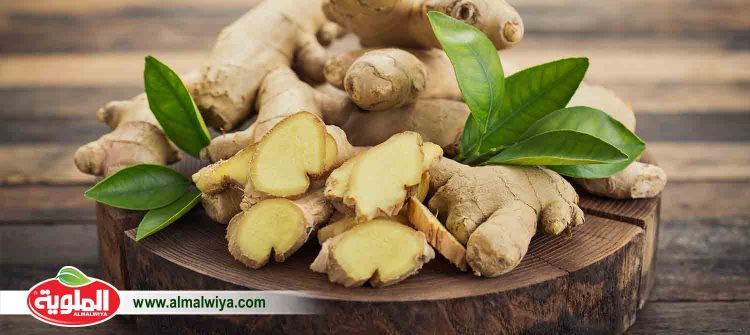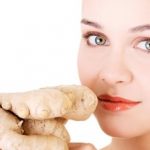Ginger
Ginger is an essential ingredient in Eastern and Asian cuisine. Learn about the benefits of healthy ginger:
Ginger is one of the root plants belonging to the Zingiberaceae plant species (Kalkum and Hill) and is characterized by strong taste strong.
Ginger is included in the list of medicinal herbs and is usually used as a spice, and can be taken fresh or drink squeezed or boiling or use powder or oil for therapeutic purposes.
It has been used as a traditional remedy for thousands of years and is famous in Chinese and Indian medicine for treating many health problems.
Benefits of Ginger
Ginger is generally considered to have many benefits for various health conditions. According to some scientific sites, what has been found about the benefits of ginger medically proven in laboratory studies on animals was:
- Reduce swelling
- Reduce blood sugar
- Lower cholesterol
- Protection against Alzheimer’s disease
- Prevent blood clotting.
But more research is needed to know for sure how it affects humans.
However, according to experiments, studies and applications of traditional medicine and physiotherapy, it is possible to get more benefits for ginger, whether by eating boiled or oil or powder use or in other ways we will talk about them as follows:
1 – Benefits of ginger to lose weight
Some studies have suggested that eating people for ginger has contributed to their loss of nearly 20% fat for those who do not. This may be because of its high content of dietary fiber, which helps to increase the sense of fullness of the stomach and thus increase satiety.
Ginger was also found to be effective in slimming and weight loss by promoting metabolism and promoting fat burning in the body.
- Ginger and blood pressure
Ginger contains active substances and dietary fiber, as well as important minerals such as potassium and magnesium. It helps maintain blood pressure levels.
This is done by reducing and controlling their levels, cholesterol levels, and maintaining arterial health.
But it is usually recommended for patients with stress to eat fresh ginger for this purpose and not crushed.
3 – Benefits of ginger for the nervous colon
It was found that ginger is considered a gas repellent and helps to combat irritable bowel syndrome and reduce the pain and associated problems.
4- The benefits of ginger for diabetic patients
Ginger contributes to lowering blood sugar levels, promoting the health of diabetics in general, and preventing some complications associated with diabetes.
However, it is advised for diabetics not to exceed 4 g of ginger daily so as not to become adverse effects and adversely affect his health, a sharp drop of sugar.
5- The benefits of ginger for cancer patients
Ginger has a major role in the prevention of various cancers such as colon cancer, prostate, breast, skin and lung, due to its high content of antioxidants and active substances.
In a study conducted by the Comprehensive Cancer Center at the University of Michigan, it was found that ingested ground ginger has a role in the elimination of ovarian cancer cells in particular.
In another study, ginger has a role in slowing the growth of cancer cells in both the colon and rectum.
6 – Treatment of headaches with ginger
Ginger is used as an analgesic and reliever for pain and has a role in the treatment of migraines.
It also helps fight inflammation in the body that may be behind the cause of head pain, headache, ease of circulation, nausea and any possible symptoms that accompany headaches.
- Treatment of colds with ginger
Since ancient times, the role of ginger in the treatment of respiratory problems and so far is effective in promoting immunity, and alleviate the symptoms of colds and winter diseases.
It also contributes to the treatment of sore throat, expands the airways and relieves symptoms such as cough and sputum.
- Benefits of ginger for sex
It has been found that ginger promotes blood circulation, making it beneficial for sexual health and increasing cravings.
Ginger may also help to treat some problems of sexual impotence and weakness, promotes erectile dysfunction, helps to delay the ejaculation process in men, and also interferes with the treatment of foul smell of the vagina.
9 – Benefits of ginger hair
Ginger helps in the treatment and strengthening of many hair problems. It has been found that ginger oil when the hair on the hair and scalp massage constantly helps to increase hair growth and treatment of falling, and found a significant role in the treatment of dandruff problem and disposal.
Ginger may help when used in the fight against the emergence of white hair, which may result from some psychological factors or lack of some nutrients, and advised to add honey to him to increase its effectiveness.
10 – Benefits of ginger for the skin
Ginger is an aesthetic benefit to the skin, it helps to lighten the skin and purify it. It helps to sterilize the skin and prevent it from inflammation.
- Ginger for pregnant women
Many studies have found a role for ginger in relieving dizziness, nausea, vomiting, headache, and stomach disorders. It also plays a major role in treating and reducing some of the symptoms associated with pregnancy.
However, it is advisable for pregnant women to eat a small amount of it without exceeding 4-2 g per day, divided into 2 to 3 servings daily, and can be added to food and salad dishes or taken as juice.
Medical Benefits of Ginger
As for the benefits of medical ginger for your body, they are:
1 – Benefits of ginger for the digestive system
It has been found that ginger helps to treat stomach and gastrointestinal disorders in general. It is used in the treatment and prevention of nausea and vomiting, and promotes digestion and absorption of substances, by stimulating the secretion of digestive juices and saliva.
Also, as a source of dietary fiber, ginger contributes to softening the bowel movement and facilitating the treatment of intestinal infections. It was also found that ginger helps in the prevention of gastric ulcers by increasing the mucus separated by the protection of the inner wall.
2- Treatment of inflammation and joint diseases
It was found that antioxidants and active ingredient in ginger are known as
Ginger contains enzymes that analyze proteins that may contribute to inflammation such as arthritis. A study found that people who ate ginger lost three quarters of their pain in joint pain.
3 – Benefits of ginger for women
For drinking boiled ginger is effective in alleviating the symptoms of menstrual cycle and the immersion of menstrual pain in women, and found that the antioxidants contained in ginger may contribute to the prevention of some cancers for women, such as cancer of the uterus and ovarian cancer.
- Ginger in the fight against signs of aging
It has been found that ginger with strong antioxidants helps reduce wrinkles and prevent signs of aging, promote skin and skin health, fights free radicals and protects cells, and promotes healthy blood circulation in skin and skin layers.
5- Ginger in the treatment of acne
It has been found that the application of boiling ginger after cooling on the skin of the face and cleaned it, actually helps to sterilize, and helps in the prevention and treatment of acne, and purify the skin and filtered.
6 – Benefits of ginger to the health of the heart and arteries and reduce cholesterol
It was found that ginger enhances the health of blood circulation and helps reduce the risk of cardiovascular disease, by its effective role in reducing cholesterol levels in the blood.
As well as being the source of a group of minerals important and necessary for the work of the heart muscle and arteries and for the regulation of blood pressure, such as: potassium, magnesium and manganese.
How to Use Ginger
Ginger has been used since ancient times in the treatment of stomach disorders and nausea, and found many evidence that proved these properties.
It has been used since ancient times to relieve pain and treat joint pain, and in the treatment of headaches, vomiting and gastrointestinal problems.
And what has been common lately about the effectiveness of the use of ginger to slim and burn fat. There is also talk about powerful recipes that improve sexual health, and enter ginger as a basic compound.
Ginger is used to reduce the symptoms of pregnancy, especially in the first months of vomiting and nausea, but there are some questions about the amount allowed to be taken from the ginger without causing any harm or adverse side effects, and some experts do not recommend the adoption of the pregnant as it may be linked to raising risk Abortion, especially if taken in high quantities.
Is ginger a solution to any kind of dizziness or nausea, is it a nausea caused by chemotherapy or pregnancy or surgery .. and other causes of vertigo!
How to Use Ginger
Ginger can be used and used in several ways, either by:
Eat the roots of fresh ginger
Soak the ginger or boil its roots and drink boiled
Eat ginger root juice
Use it as a kind of spice that is added to different cooks
Use ginger powder
ginger oil.

Recipes to use ginger
Let us introduce you to a range of aesthetic recipes that can be used by ginger:
- Ginger blends for slimming:
You can eat fresh green ginger with cinnamon, as it is found that ginger and cinnamon contain effective substances that promote metabolism and burning fat.
Or drink boiled ginger and filtered and add lemon juice to him, or drink dipped green ginger, but with attention to the amount handled so as not to exceed a cup a day, preferably consult and guidance doctor or nutritionist and taking into account the history of health.
2- Ginger Blends for Hair:
Use ginger oil with a mixture of other oils such as castor oil and olive oil, apply the mixture on the scalp with circular massage, and then bring a hot towel and roll your hair out.
In other recipes can be used ginger powder with the addition of the same mixture of previous oils and applied to the hair and left for a period of time and can add greased ginger to the recipe to increase the usefulness.
3 – ginger mixtures for the skin:
Make a mixture of dried ginger or grated fresh ginger with a tablespoon of honey and a tablespoon of rose water.
Wash your skin thoroughly and then apply the mixture for a quarter of an hour, then wash your face.
Or you can use a mixture of ground ginger, lemon juice and white egg and put it on your skin for no more than ten minutes and then wash your face and note the difference.
The amount allowed to be ingested of ginger Usage warnings:
The daily amount of ginger is not specified for each case. The products and supplements that contain ginger differ from one product to the other in their concentrations and the amount of active substances. This makes it difficult to determine the daily doses.
However, some references may recommend no more than 2 to 4 g of ginger daily, and are dealt with divided into two to three servings. Knowing that half a gram of dried ginger equals two grams of fresh ginger. Children under 2 years of age are not recommended to eat it.
Save ginger
To keep fresh green ginger, it is advisable to start by avoiding the purchase of wet or rotten ginger, and keeping it in the refrigerator without crunching inside a special bag for a period not exceeding three weeks, and can be kept in the freezer for a period of more than 6 months.
When cutting a small piece of ginger, sprinkle or rinse it is recommended to keep it in the refrigerator in a tightly sealed bag.
Ginger damage
Ginger is generally listed as a generally recognized GRAS (Generally Recognized As Safe) by the Food and Drug Administration (FDA).
As for the side effects and damages that may result if the amount of daily consumption of ginger exceed the required limit, they include:
Decreased blood sugar levels
Glaucoma and viscosity in the blood
Gastric acidity
Nausea and vomiting.
Herbs and foods that are inconsistent with ginger
It has been found that ginger may interfere with foods and herbs that are anticoagulant and can be treated with it. It can cause bleeding, such as parsley, ring, cloves, red pepper, garlic, onions and licorice.
Health conditions and diseases that are inconsistent with ginger
Depending on the side effects that ginger may cause, especially when taking large amounts of it, the following cases should be used with caution when using:
- Diabetics avoid eating large amounts of it as it may lead to lower levels of sugar in the blood and therefore a drop in sugar.
- Gallbladder patients are not recommended for consumption.
- It causes heart palpitations and affects the pressure, so it is recommended for heart patients and blood pressure to avoid eating and consult a doctor.
- Patients suffering from coagulation and blood transfusion problems are advised to consult a physician before using it and to know the permissible doses.
Types of ginger
There are several types of ginger, some of which are divided by color to: yellow ginger, green ginger, white ginger, and blue ginger. Including what is divided by the origin of its growth area to:
- Al-Rasen (Gingerbread)
- Ginger spicy
- Shami Ginger
- Persian Ginger
- Indian Ginger.
The difference between fresh green ginger and powder
Usually, the proportion of volatile oils in fresh ginger is higher than in dry and its flavor is stronger, so it is recommended to eat fresh when the treatment of problems requiring strengthening immunity and control of microbes.
The active ingredient in ginger is ginger, which is found in all types of ginger and its forms, but what distinguishes fresh green ginger from dried ginger is that the dried powder contains soguel, which is formed during drying, which is a pain reliever but it also works to raise blood pressure. Contrary to what green ginger adds to its fresh advantage of its ability to lower blood pressure.
The nutritional value of ginger
Ginger is a source of many beneficial nutrients. It contains a number of important vitamins and minerals, such as magnesium, potassium, iron, vitamin B6 and vitamin B3, as well as its dietary fiber content.
Here are some nutritional values that contain 100 g of fresh ginger root: (For the nutritional value of ginger click here)
Ginger Nutrient Table:
Food ingredient nutritional value
Calories are 80 calories
Proteins 1.82 g
Carbohydrate 18 g
Fat 0.75 g
Food fiber 2 g
Vitamin C 5 g
Vitamin B3 0.75 g
Vitamin B6 0.16 g
Potassium 415 g
Iron 0.6 g
Magnesium is 43 g
What are the permitted quantities?
Ginger amounts used for therapeutic purposes:
- The recommended dosage is 2-4 grams of ginger daily, divided into two – three servings.
- Half a gram of dried ginger is equivalent to two grams of fresh ginger.
Summary of Benefits of Ginger
Summarize the recommendations of plant experts on the benefits of ginger:
- Ginger contains substances that regulate the work of the digestive system, especially prevention of nausea and vomiting.
- It is usually recommended to consume 4-2 grams daily, divided into 2-3 doses, to relieve nausea pregnancy.
- Ginger contains anti-inflammatory substances, which can contribute to the relief of arthritis.
- Contains anti-oxidant and anti-cancer materials.
- It is recommended to use ginger as a healthy spice in particular, in frequent intervals in the weekly menu, and as a natural treatment to relieve nausea and inflammation.





